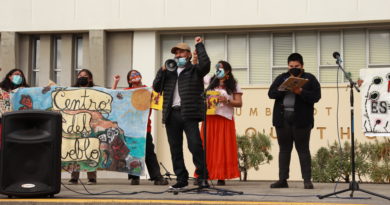COVID-19 Related Racism and Xenophobia Hits Humboldt County
Humboldt County may be behind the rest of the country in terms of the number of COVID-19 cases, but like the rest of the U.S., there have been instances of racial discrimination and xenophobia directed against the Asian community.
According to a report from the Federal Investigation Bureau’s Houston Office, it is predicting that the U.S. will see an increase in the number of hate crimes against Asian Americans. This prediction is based on the association that people have been making between COVID-19 and Asian Americans.
Some residents of Humboldt are beginning to see this prediction come true. Humboldt State University senior and Asian Desi Pacific Islander Collective (ADPIC) President and Coordinator Tammy Prakonkham is one of these people.
Phrakonkham said that ADPIC held a meeting in January when COVID-19 was first detected in the U.S. In that meeting, she said that a lot of members shared that they felt like they were experiencing misdirected racism just for being Asian.
“Historically, referring to people as less than human, the use of otherization and scapegoating, have been the first steps towards forced removals, concentration camps, internment camps, lynchings and genocide.”
-Douglas Smith
Phrakonkham said that she experienced this kind of discrimination on multiple occasions. One was during a class discussion where students were making racist comments about why the coronavirus originated in China. She says that the professor failed to step in and say anything, so she ended up dropping the class.
“I was just like, this isn’t a class that I really want to be sitting in… And I was the only Asian person in that class, and I just felt super uncomfortable,” Phrakonkham said.
Another incident occurred when she was on a packed bus on her way to school. She said she had an open seat next to her and offered it to an older man, but he refused to sit next to her and then started to go on a tangent about the coronavirus.
“I feel like you should definitely not let someone be racist or just, you know, xenophobic or any kind of ism to somebody else,” Phrakonkham said.
Douglas Smith, coordinator for the African American Center for Academic Excellence, also believes that it’s important for people to step in when witnessing discrimination.
Smith witnessed an exchange between an Asian student that he recognized and another student. The other student was asking the Asian student things that Smith said qualified as microaggressions, which are subtle or unintentional statements or actions of discrimination against members of marginalized groups. Smith waited until fewer students were present and then went to talk with the student who had asked the questions.
While he didn’t think their intention was to be harmful, Smith explained to the student why the questions they asked were problematic.
Smith also noted the deeper consequences that these acts of racism and xenophobia can have.
“Historically, referring to people as less than human, the use of otherization and scapegoating, have been the first steps towards forced removals, concentration camps, internment camps, lynchings and genocide,” Smith said via email.
This topic has been prevalent on social media as well.
People have shared their stories about COVID-19 related discrimination that they’ve experienced due to their race. Some people have even managed to capture these moments on video and have posted them online.
Residents of Humboldt have also taken to social media to share their experiences.
On the Facebook group Humboldt County On Alert, member Mai Conway shared her own experiences of how others have treated her.
“It’s ridiculous I can’t go out in public without being told to get away from someone because I supposedly have the coronavirus…,” Conway said in her Facebook post.
Phrakonkham said that when people like President Donald Trump use language like the “Chinese virus,” it can give the public someone to blame and cause misdirected anger and fear.
However, it’s not all bad. Phrakonkham said that one positive that has come out of this situation is that Asian communities have come together due to an “us against them” mentality.
She also noted that she’s seen a lot of non-Asian people trying to support Asian business. Ultimately, she hopes that everyone can support each other.
“I understand that, you know, people are scared and angry, and it’s really uncertain right now,” Phrakonham said. “I know that a lot of people have lost a lot of jobs with the shutdown. But I just hope, you know, that we can all just be nice to each other.”




